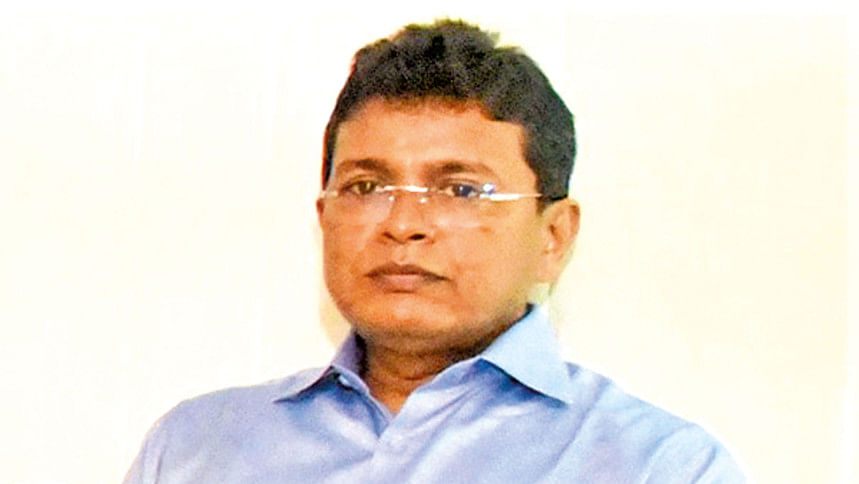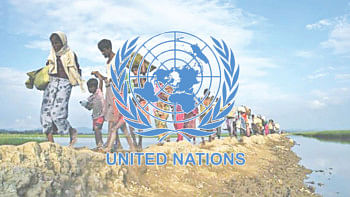‘Enthusiasm has dwindled due to mobile phones’

As general secretary of the Bangladesh Kabaddi Federation, Habibur Rahman has been playing a key role in reviving the sport in the country. Habibur, also Deputy Inspector General of Dhaka range police and senior vice-president of World Kabaddi Federation, spoke to The Daily Star's Anisur Rahman about the federation's initiatives and the limitations.
The Daily Star (DS): You are also in a vital post in Bangladesh Police. How do you carry out both responsibilities?
Habibur Rahman (HR): Policing is my occupation but kabaddi, our national sport, is my passion. Kabaddi was chosen as the national sport by the Father of the Nation. According to experts, kabaddi originated in Faridpur and Tamil Nadu. After staging international kabaddi events in Bangladesh, the world knows that kabaddi is Bangladesh's game. The World Kabaddi Federation is also happy with our initiative. Although over 200 countries play kabaddi, only Bangladesh has designated kabaddi as its national sport.
DS: What changes have you made since becoming general secretary in 2017?
HR: Bangladesh once used to be in a good position, becoming runners-up behind India at the international level. However, Bangladesh lost their position while India kept theirs intact. Others like Iran, South Korea and Pakistan also came forward and surpassed Bangladesh as we were stuck in limbo. We have been trying to rebuild kabaddi although I am not completely satisfied with the progress made over the past five years. If I consider the ability of our committee, then I will say it is the third-most vibrant federation after cricket and football. But we could not progress as expected because kabaddi regressed a lot before we took over.
DS: What do you plan to achieve?
HR: Our goal is to build the image of the country at the international stage by making the kabaddi team strong. Although it has been a long process, we want Bangladesh to always fight for first place in international competitions.
DS: What have been your findings in the past five years, negative and positive?
HR: I want to share a different problem. The enthusiasm and interest in sports has reduced among the general populace due to mobile phones. Now you can't see enthusiastic gatherings at playgrounds in the afternoon, which was a common sight in the past. The situation was heated when Abahani and Mohammedan played, but there is hardly any interest among people regarding the two traditional archrivals now. For these reasons, the number of athletes has also reduced. At the same time, the number of organisers has also come down. When numbers fall, quality deteriorates.
DS: What things do you think need to be done to recapture past glories?
HR: Kabaddi is a combination of strength, stamina and technique but we have problems regarding our physical strength due to geographic and weather conditions. There is also a concept among people that kabaddi is a dangerous game that injures players, so guardians are less interested in sending their children. Apart from those two problems, there is a comparative lack of patronisation from the government. So, we have to overcome these hurdles and the kabaddi federation must have a long-term plan and implement it accordingly. We are about to frame a long-term plan.
DS: The IGP Cup youth kabaddi tournament had a huge impact on upcoming players. Do you have any long-term plan to keep those youths involved in kabaddi?
HR: We have already picked up some talented male and female players from the IGP Cup and provided them with improved training to groom them for the national team. We also have plans to work with players who weren't selected from talent-hunt programmes. Another area of progress was making the government and BKSP understand that BKSP should also focus on kabaddi. Now, kabaddi has been included in BKSP. In terms of infrastructure, we are taking initiatives to build a kabaddi institute near Dhaka. We have already made two private kabaddi stadiums in Moulvibazar and Bagerhat.
DS: How are Bangladesh benefiting from the Bangabandhu Cup without Bangladesh's main rivals: India, Iran, Korea and Pakistan?
HR: The tournament of course has an impact on those Bangladeshi players who can't take part in the Indian Pro-Kabaddi. Many players, who play in the Indian Pro-Kabaddi, feature in different teams and our players get the chance to play against them. I think Bangladesh is also contributing to developing kabaddi worldwide by hosting the Bangabandhu Cup. We hope to stage the next edition with 12 teams.
DS: Do you have any plans to introduce a money-spinning league that can attract the younger generation?
HR: We want to introduce a franchise-based Bangladesh Kabaddi League with the participation of six teams. Many corporate houses have shown interest and we have all but confirmed six teams and completed initial discussions.
DS: Do you have any plans to introduce a salary structure for national kabaddi players?
HR: Most national players are from service teams and are paid by their respective teams. Those national players also get incentives if they perform well for the national team. It is true that national players outside service teams do not get much financial benefit. Hopefully, we will make a positive decision about the salary structure of the national players within a short period.

 For all latest news, follow The Daily Star's Google News channel.
For all latest news, follow The Daily Star's Google News channel. 



Comments